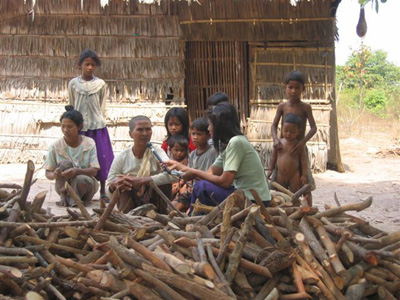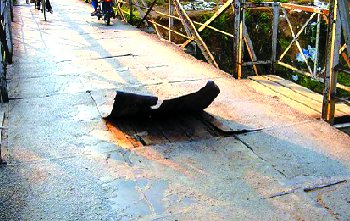RENCONTRER
DIEU |
COURRI@L
2005
|
MEET
WITH GOD |
How sensible are sanctions against an authoritarian regime? (2005-Mar-08)
Samngatki : In a letter published in today's Cambodia Daily,
opposition leader Sam Rainsy clarifies his position about possible
sanctions against the current Cambodian government. He notably says: "Imposing
sanctions on any authoritarian regime is a controversial issue as it may
be argued that only ordinary and innocent people – not the privileged and
guilty leaders – would suffer from such sanctions. But for Cambodia, the
ordinary people have been already and intensively suffering following decades
of authoritarianism, neglect and corruption (...). I am not asking
for a suspension of any well-intended foreign assistance to Cambodia, [but
for] guarantees that [the] assistance will actually reach those who need
it most, meaning the poor and innocent Cambodian people, instead of being
diverted into the pockets of a small number of corrupt leaders."
Funcinpec parliamentarians opposed to removal of their SRP colleagues'
immunity
K.I. 05 March 2005 : « Assembly's Legislation Committee
Chairman: "Secret ballot required for vote on immunity" ». Ranariddh
had to impose a vote by show of hands
in order to attain his goal. It was at the cost of violating the Parliament's
own rules that the Speaker was able to secure an impressive unanimous vote
from all the parliamentarians who are supposed to support him.
N.P.
: Norodom Vacheahra said she would have voted against the removal if
the very SRP parliamentarians stayed at the House and defended themselves.
Potential scandal at the World Bank
K.I. : King-Father Norodom Sihanouk has noticed a 1st March
2005 article in the Bangkok-based daily newspaper The Nation that
points to a potential scandal at the World Bank. The article titled "Cambodia,
the World Bank and demobilization", by Sophie Richardson, elaborates on
"bank complicity", involving "staff
members in Phnom Penh, Bangkok, Singapore and Washington", in the fraudulent
collapse of a multi-million dollar demobilisation program in Cambodia.
The "bank complicity" is allegedly responsible for up to 40 percent of
all misused funds.
Sans pluie, l'eau vaut de l'or
(2005-Mar-01)
Kampong Trach, Kampot : En plus de la
sécheresse en 2004, il n'est pas tombé une seule goutte de
pluie depuis trois mois en cette saison sèche 2005. Les étangs
se tarissent. Non seulement les villageois mais aussi leur bétail
et les animaux d'élevage ont besoin de boire. Des gens viennent
puiser de l'eau des srahh (large étang) dans les pagodes,
d'autres, à bicyclettes, s'improvisent vendeurs d'eau (200 riels
le bidon) qu'ils ont eux-mêmes achetée (100 riels le bidon)
des propriétaires de puits. [Koh
Santepheap] |
|
| Famine dans Kampong Chhnang (2005-Fév-27)
Radio Free Asia : Kdourch est un tubercule
sauvage qui pousse dans la forêt. Les contes et légendes disaient
que des gens sans ressources creusaient le sol pour en trouver et en mangeaient
à la place du riz. L'adjectif Poul-Kdourch (intoxiqué par
ce tubercule) est bien connu et utilisé au propre comme au figuré,
car le tubercule est assez fréquemment toxique.
4000 familles dans le district Samaqqi Mean Chey, Kampong Chhnang, sont
touchées par la sécheresse de l'année dernière
et ont de plus en plus recours au Kdourch pour subsister. Les paysans
se livrent à des activités complémentaires pour trouver
de revenus. Ceux qui le savent, tissent les feuilles de latanier pour en
faire des nattes. Les enfants aident leurs parents en allant couper du
bois de cuisine pour en vendre. Le chef de district réclame des
fonds pour réparer 4 réservoirs capables d'irriguer 10.000
hectares. |
 [Photos Ouk Savborey]
[Photos Ouk Savborey] |
From "Asia Security Monitor" (2005-Feb-25)
1) SOUTHEAST ASIAN STRIFE COULD DRAW AL-QAEDA
February 19: Following a spate of recent bombings, Prime Minister
Thaksin Shinawatra has announced his government’s plan to cut financial
aid to Thailand’s restive south. Agence France Presse reports that the
country’s majority-Muslim “red zones” – the Narathiwat,
Yala and Pattani provinces – could be denied development funds as
a result of ongoing separatist violence and the pro-rebel stances of their
respective administrations. The Thai Premier has publicly ruled out negotiations
with the separatist elements, instead opting to “color-code” over 1,500
villages according to their degree of violence, separatist sympathy, and
their level of government cooperation. More than 350 villages across the
three major southern provinces could be affected by Thaksin’s controversial
policy.
The Philippine Star reports that Manila is poised to get a boost to the
intelligence and counterterrorism capabilities of its military, courtesy
of the United States. According to Philippine Defense Secretary Avelino
Cruz, the Bush administration has earmarked $4 million in 2005 for the
“upgrade of equipment and training of intelligence elements” of the Armed
Forces of the Philippines. The funds are part of close to $32 million expected
to be provided by the United States to the Philippines
this year as part of the ongoing counterterrorism cooperation between Washington
and Manila.
February 20: Terrorism analysts are warning that the tactics
employed by the governments of Thailand and the Philippines in response
to Muslim separatist violence could have unintended consequences. According
to Rohan Gunaratna, a terrorism expert with Singapore’s Institute of Defence
and Strategic Studies, Arab pro-al-Qaeda websites are “highlighting
the Thai issue,” and the “[p]rologation of this conflict will mean
greater involvement of other regional groups and global groups like Al-Qaeda.”
This is particularly true in the Philippines, which already has a “permanent
Al-Qaeda presence,” Agence France Presse reports Gunaratna as saying.
Robert Broadfoot of the Hong Kong-based Political and Economic Consultancy
agrees; he tells the news agency that, “[t]he
grievances in southern Thailand are local but as we saw in Indonesia and
the Philippines, Al-Qaeda and international groups have been able to take
advantage of those local situations.”
2) MOMENT OF TRUTH FOR PAKISTAN’S MILITARY
February 13: Worried over Nepal’s deepening turmoil and authoritarian
drift, India has cut off military aid to the government of King Gyanendra,
the Associated Press reports. Since dismissing the government and declaring
a state of national emergency on February 1st, the Nepalese government
has rolled back individual freedoms and deployed its military against the
country’s massive Maoist rebel movement. The moratorium comes as a major
blow to Katmandu, which has received $93 million in military aid from New
Delhi over the past three years. Nepalese officials, however, remain defiant;
a day earlier, the South Asia Tribune had reported that King Gyanendra
has intimated a cessation of military assistance from New Delhi could force
Katmandu to reconsider the 40-year-old treaty between the two countries,
and turn to Pakistan or China for arms supplies.
February 18: The struggle for control of Pakistan’s military
is reaching a boiling point, the South Asia Tribune reports. Since two
failed attempts on the life of President Pervez Musharraf in December
2003, the Pakistani government has launched a clampdown on “internal rebellion”
within the country’s military – one that has already garnered the death
penalty for several rogue Army and Air Force officers. Now, however, Musharraf’s
efforts to ingratiate his country’s military to the United States have
widened the rift between the government and militant
factions within the Army, Air Force, Police and Inter-Services Intelligence
– setting the stage for a struggle for control between officials in Islamabad
and “Islamic extremists and their ideological partners in the garrison
[who] are acting in unison to eradicate the key American ally in the U.S.-led
war against terror.”
Copyright (c) 2005, American Foreign Policy
Council
Qui s'y frotte s'y pique (2005-Fév-21)
ou Le sang crie, La peau appelle
Koh Santepheap : Dans
la province de Battambang, le vieux pont métallique enjambant la
rivière Stung Sangkè est devenu dangereux. La rouille et
l'absence d'entretien ont causé l'arrachage à moitié
de deux plaques de revêtement de la dalle. Des accidents surviennent
la nuit, le pont n'ayant pas d'éclairage. Au cours des deux semaines
passées, 30 personnes ont été blessées par
ces plaques. La population blâme le nouveau chef du district Battambang,
Ouy Vy, l'accusant de désinvolture.
N.P. : Dans des pays démocratiques,
les ponts et routes sont plutôt sous la responsabilité des
ministères de Transport ou des Travaux publics. Mais au Cambodge
anarchique et corrompu, la population ne regarde que les personnes hiérarchiquement
au-dessus d'elle dans la vieille tradition centralisatrice : chef de district,
gouverneur de province, roi ... ou premier ministre. Les blessés
peuvent toujours penser au dicton "Le sang crie, la peau appelle" ou plutôt,
pour ce cas-ci, "Le pont crie, l'acier appelle"
...
GOD
vs BUDDHA
|
camboDIATRIBE
|
COURRI@L
2005
( PREVIOUS )
|
AUTRES
SITES KHMERS
|
KUN
PIMOJ 's HOMEPAGE
|
PHN@M-P@NH-P@TINS
|
FRAN-GLO-GIBWÉ
|
CANADA
3 FOUNDERS
|
MES
EMAILS 2003
|
THE
6 COMMANDMENTS
|
MEET
WITH GOD
|
PEN Nearovi, Montréal, Québec, Canada
(nearovi@sympatico.ca)





